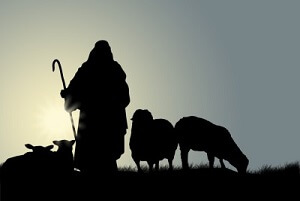
Those who study Hebrew letters know that they were originally pictures. The letter “zayin,” for example, looks like a scepter—something a king would hold in his hand as he ruled over a nation. The letter “lamed” has a similar shape but depicts a “rod”—a wooden staff—that still symbolizes authority, but is something seen in the hand of a shepherd rather than a king.
The prophet Micah speaks to a scattered people. Chastisement had come upon the people, their “nation” had collapsed, and the people had to run for their lives. No longer could they turn to a king and an organized nation to provide them leadership and security. Where would they find leadership? (Micah 7:14-20).
“Shepherd your people with your staff, the flock of your inheritance, that dwells apart in a woodland in the midst of Carmel. Let them feed in Bashan and Gilead as in the days of old; as in the days when you came from the land of Egypt…”
God was going to replace the “scepter” with a “staff.” Instead of being an organized nation, Israel now consisted of scattered flocks of sheep. Instead of living with the conveniences of a city, they now struggled for survival in the “woodland” near the mountains. They needed someone to lead them, protect them, and provide for their needs; in short, they needed a shepherd. Micah asks God to be, not their king, but their Shepherd. He reminds God of “the days of old” when Israel was just getting started—a time similar in circumstance to what they were now experiencing. God fed them in “Bashan and Gilead” during the days after they had journeyed from Egypt. The prophet asks God for a “repeat performance.”
“…show us wonderful signs.”
Conditions were such that the people, once again, needed miraculous interventions.
“Who is there like you, the God who removes guilt and pardons the sin for the remnant of his inheritance; who does not persist in anger forever, but delights rather in clemency.”
It was their sin that brought on Israel’s chastisement. They were well aware of this and were weighed down with guilt. Only God had the power to remove their guilt and pardon their sins. Micah appealed to the clemency of God, something God “delighted” in offering.
God is at his best when he deals with our sins, just as a shepherd is at his best when he tends to lost and wounded sheep.
“… again have compassion on us, treading underfoot our guilt…You will cast into the depths of the sea all our sins; you will show faithfulness to Jacob and grace to Abraham.”
Micah played the “patriarch card” by reminding God of his promises to Jacob and Abraham that extended to their children. First on the agenda was the removal of their guilt.
In our day when many churches are closed down and services are extremely restricted, we are beginning to feel like the “remnant” of Micah’s day. Not having the security of a well-organized, smoothly functioning church, we remind ourselves that Jesus is a Shepherd, not sitting in a comfortable office, but standing amid his flock with staff in hand. A shepherd is near his sheep in a way that kings cannot be with their subjects. Going through the anxieties of confused sheep, we turn with repentant hearts to our Shepherd and ask him to tread “underfoot our guilt” and lead us as in days of old. Our Shepherd will not abandon us.
“You have forgiven the guilt of your people; you have covered all their sins” (Ps 85: 3).
